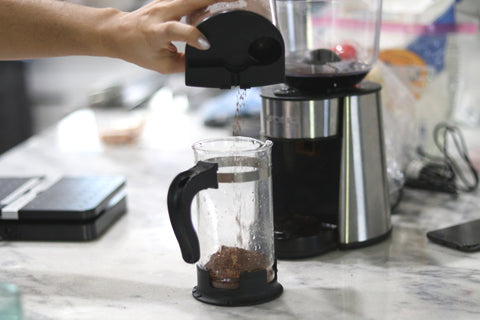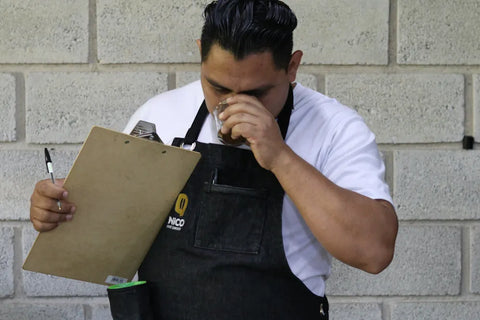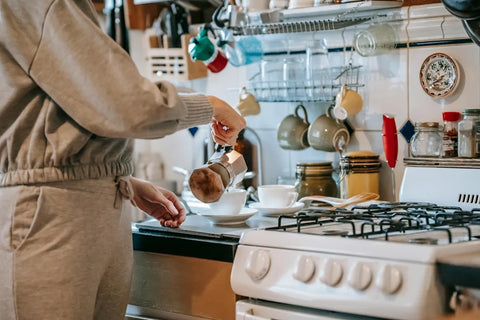How Can I make my coffee less bitter?

When we discuss the bitterness of coffee, we are referring to a characteristic inherent to coffee itself.
This bitterness can vary depending on factors such as the degree of roasting and how it is prepared. Here, we will explain methods for effectively dealing with the bitterness in your coffee. Go directly to the tips.
Many people think that good coffee has to be bitter and low in acid. If you have learned more about good coffee, you know that the reality is just the opposite.
A good coffee has to have acidity and sweetness, giving it life. Otherwise, it would be very flat.
But bitterness isn't always a bad thing; if your coffee doesn't have any bitterness, it won't be balanced; a small amount of bitterness will ensure complexity and complement other flavors without being overpowering.

In coffee, there are 4 primary tastes:
- Acid
- Bitter
- Sweet
- Salty
There is no doubt that drinks that are too bitter are bad, so here is a little more information about the bitterness of food and drinks:
The sensory cells on our tongues contain proteins, and about 35 of them react with compounds in food to create the experience of bitterness.
These are called phenolic compounds, and some of the most frequent are chlorogenic acids; they represent up to 8% of the dry mass of the green beans of the arabica species and greatly influence the sensory elements of coffee.
Although the bitterness comes from chlorogenic acids, caffeine also plays an essential role in it (it is not surprising that the robusta, having more caffeine, is always more bitter than the arabicas, they have up to 10% chlorogenic acids).
In order not to get too technical, we will only mention other factors that also influence bitterness: bean variety, degree of ripeness, agricultural practices, and, of course, roasting.
What happens in roasting is that the chlorogenic acids break down chlorogenic acid lactones into something called phenylindanes.
Light and medium roasts have more acid lactones, and darker roasts have more phenylindanes giving a bitter and harsh sensation.
So light to medium roast coffees are more likely to taste less bitter and still contain the classic coffee aromas and flavors we know and love.
Dark roast enhances roast flavors.
Many coffees are roasted too much to cover the defects in the bean and homogenize the typical "roasted" flavor; here, flavors such as burnt rubber, carbon, and ash may have a super bitter aftertaste.
For this reason, many people who are sensitive to flavor do not like coffee🥲

Tips to improve your cup.
The Brew method, grind size, and brew time are generally the variables you should change. There are a couple of things you can do to get a less bitter coffee cup:
- Grid your coffee coarser than usual. If it's a drip coffee, instead of a medium grind, use a medium-coarse grind, like sea salt.
- Decrease the amount of coffee. You can start using ¾ parts of the amount of coffee you usually use for your recipe.
- Use a lighter roast. We are fans of medium roasts for balance reasons.
- Check the water temperature, the hotter the more efficiently the flavor and aroma compounds will be extracted, if your coffee is bitter use slightly colder water.
Note: You don't have to try the four options simultaneously; we strongly recommend trying one at a time and seeing which works better!

These tips apply to any drip and immersion method (french press, cold brew, or Aeropress); if you are working with espresso, check this post on improving your espresso flavor.
Summary
In conclusion, when we delve into coffee bitterness, a truly exceptional cup of coffee requires a balance of acidity, sweetness, and, yes, even a touch of bitterness.
This bitterness adds complexity and enhances the flavor profile without overpowering other delicate notes.
So, embrace the subtle bitterness in your coffee, as it plays a vital role in achieving a well-rounded and satisfying brew.
Keep reading:
Instant Coffee vs. Brewed Coffee: Which is Better?
How to Taste Coffee Like A Pro?
Latest Coffee Blog Posts

Our Coffee-Filled Adventure at Coffee Fest Orlando 2025
Coffee Fest Orlando 2025 brought together coffee lovers, roasters, and café owners for an unforge...
Read more →
Is there a sommelier for coffee?
Ever heard of a Q-grader? Often called a coffee sommelier, these certified professionals are the ...
Read more →
Which Coffee Roast Works Best with Your Machine?
The coffee roast you choose can make or break your brew. Learn which roast level pairs best with ...
Read more →